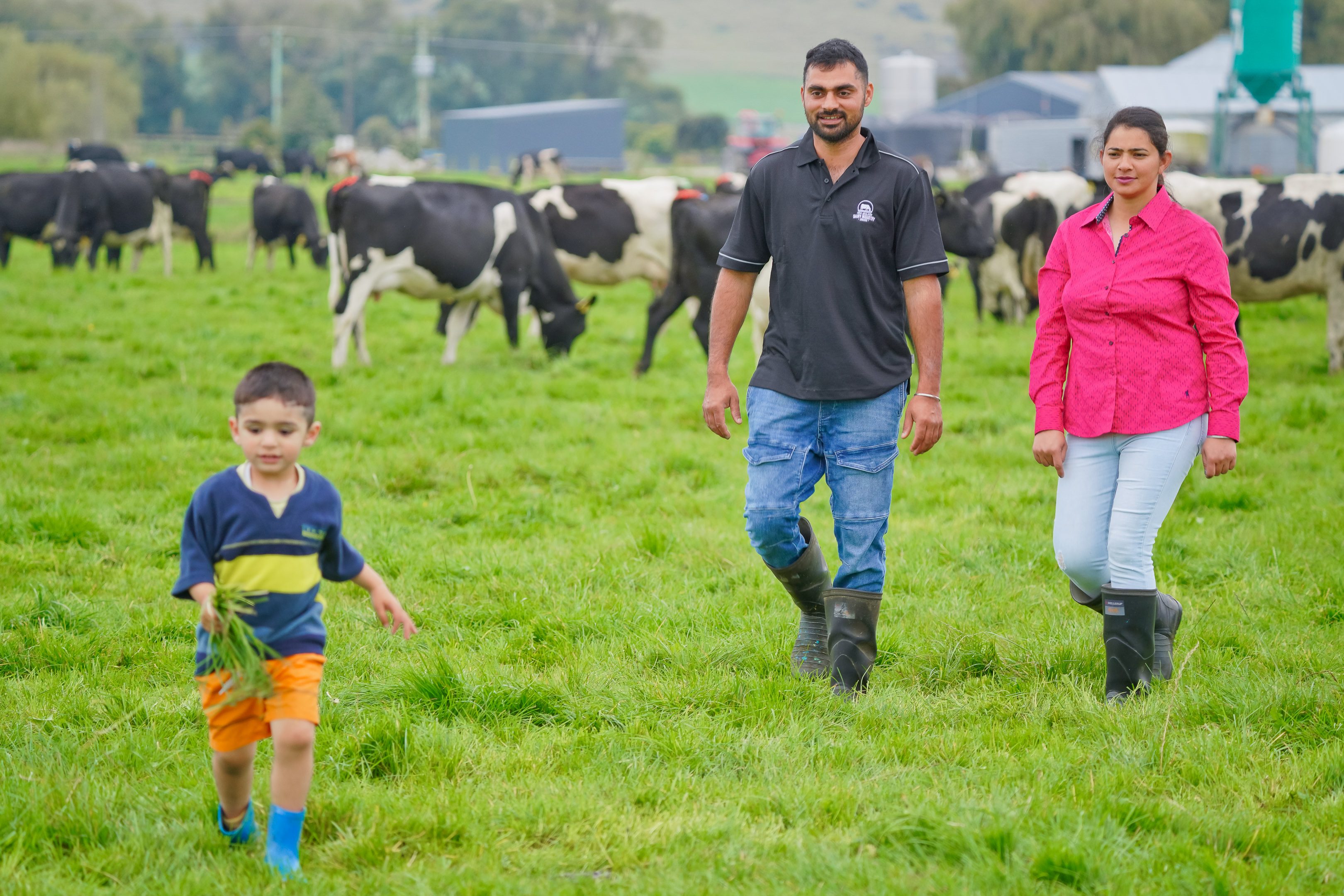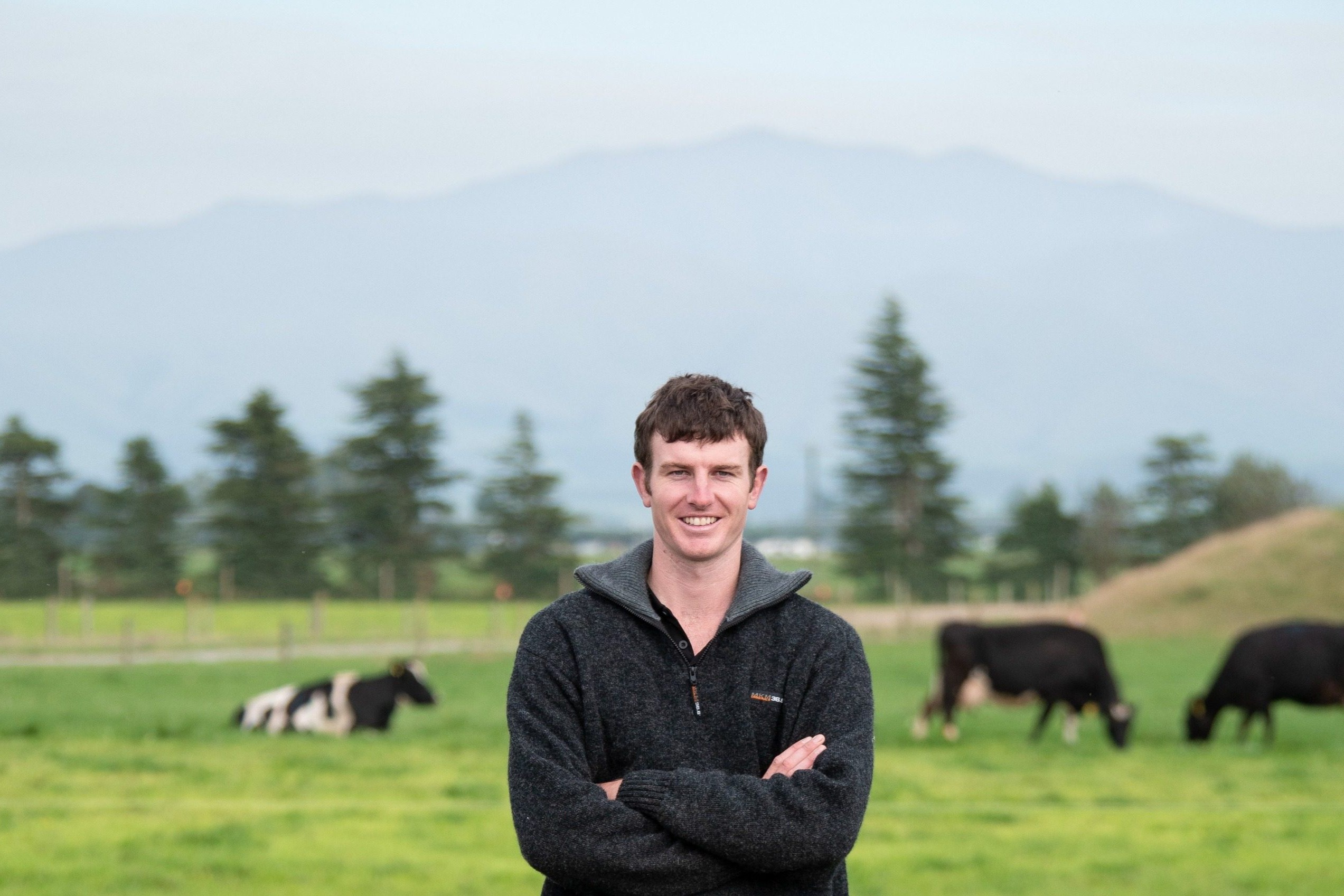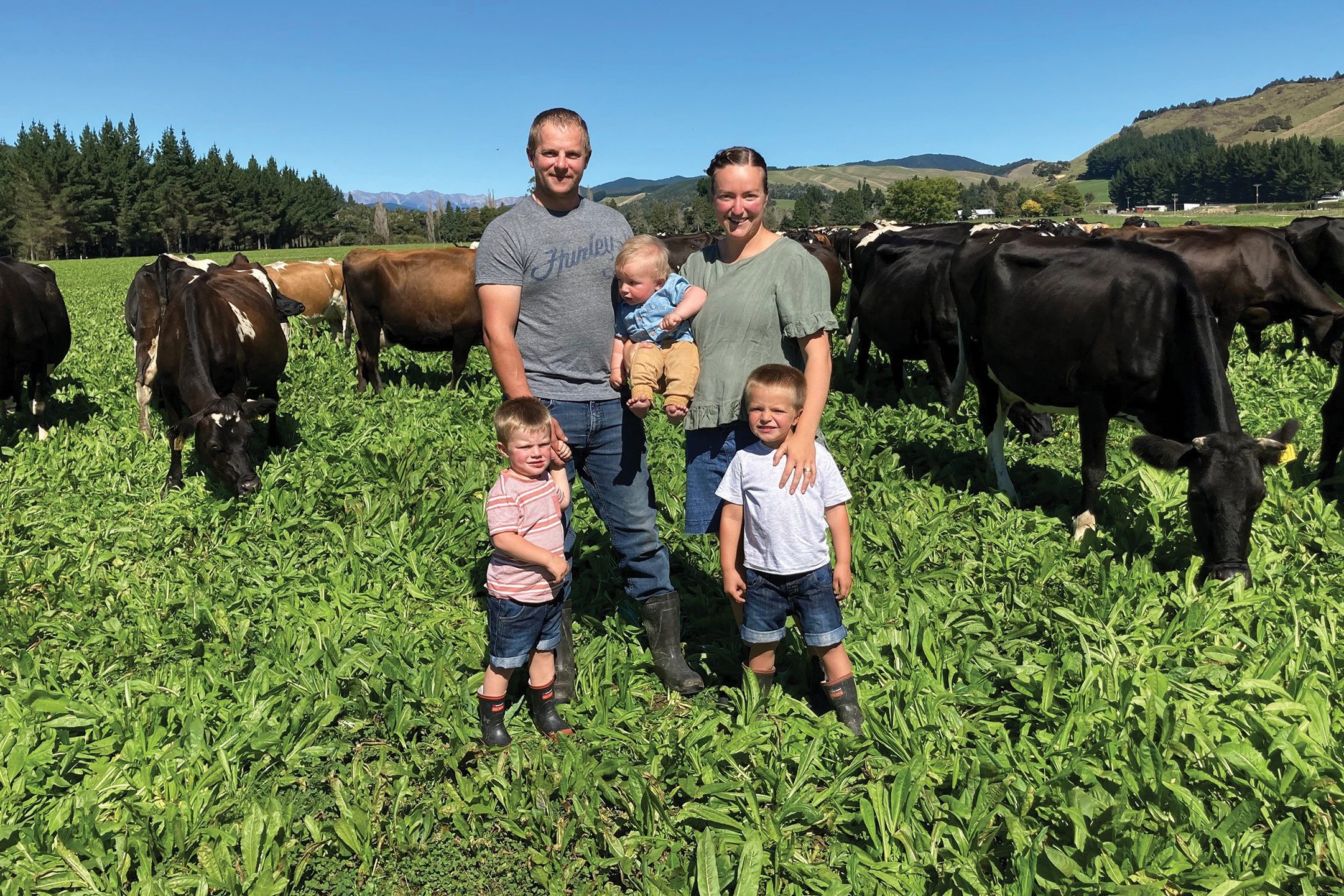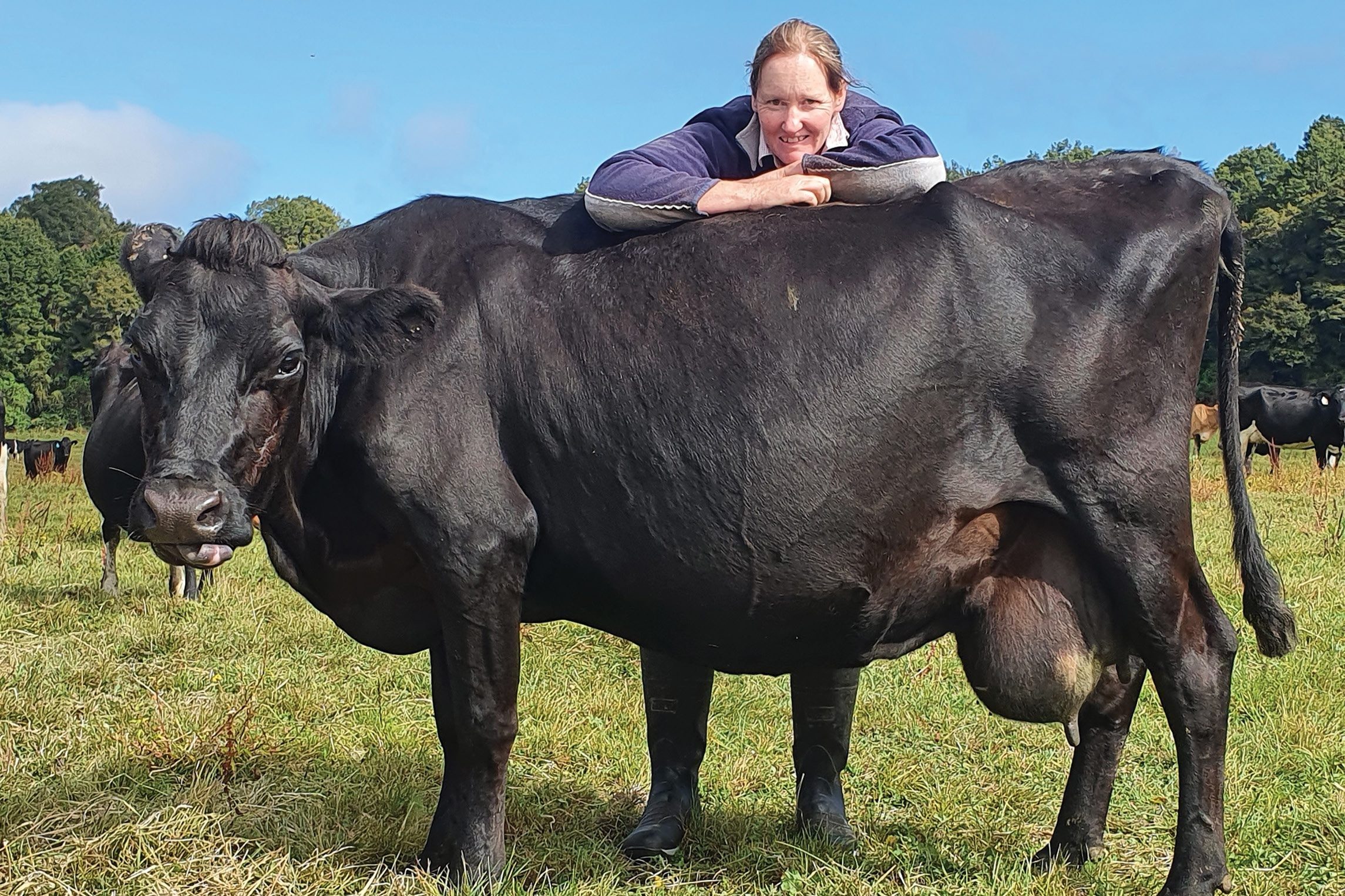By Claire Ashton
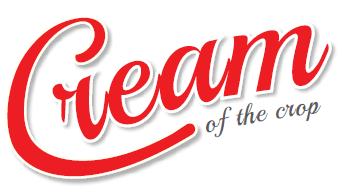 It was a whirlwind few days for young farmers Rachel Bunnik (23) and Brian Basi (25) when they took out the Waikato Dairy Industry Award for Share Farmer of the Year on March 14.
It was a whirlwind few days for young farmers Rachel Bunnik (23) and Brian Basi (25) when they took out the Waikato Dairy Industry Award for Share Farmer of the Year on March 14.
Brian jokes that despite all the attention following their win, they are just keeping on with milking the cows, on their current 72-hectare, system 4, 230 Holstein Friesian cow farm where they contract milk for Liz and Dick Johnson at Putaruru.
The couple say it was amazing to attend the awards dinner and, although they were supported by a limited amount of family due to restrictions, they were surrounded by a room full of people who are just as passionate about dairying.
Both come from dairying backgrounds with both their parents owning dairy farms 10 minutes out of Hamilton . After finishing high school, Rachel did a year studying Agriculture at Massey University but missed hands-on farming too much and returned to the family farm. She then trained to be an LIC AB technician and does an AB run in spring,
“It’s a great way to meet local farmers and network,” she says. Brian worked on his parents’ dairy farm after finishing high school, “books were never my thing so studying didn’t interest me, I’d rather be out learning in the paddock.”
During the 2021-22 season, they are contract milking, and next season they are 50/50 sharemilking together in Roto-o-Rangi.
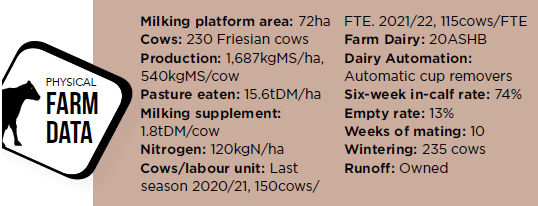 Brian had entered the DIA Awards solo (with support from Rachel) in 2021, as then they were contract milking on separate farms which also helped them grow equity for their future sharemilking role. Their journey through the awards process this year was primarily about time management and the main challenge was just getting it done – there were certainly a few sleepless nights.
Brian had entered the DIA Awards solo (with support from Rachel) in 2021, as then they were contract milking on separate farms which also helped them grow equity for their future sharemilking role. Their journey through the awards process this year was primarily about time management and the main challenge was just getting it done – there were certainly a few sleepless nights.
He received advice after entering the awards last year about what to do when receiving the set of financials, benchmarking and DairyBase, and was advised to “dig deep into those financials and see where you can improve”.
Goal setting and future planning are first and foremost for the couple. “We want to make sure we are running a sustainable, profitable business under all circumstances and market volatility.”
Rachel observes that the takeout Brian had from 2021 was to question everything he was doing. Health and safety was one area that clearly needed improvement, so they went away and came up with a system they were highly complimented on, reflected in them winning the Honda Farm Safety, Health & Biosecurity Merit award. The main objective was to come up with an easy-to-understand and simplified system everyone could follow while still comprehending the onfarm hazards and they are now keeping this closely under wraps until Nationals.
Despite the couple knowing what they were in for with the awards process, life has a habit of throwing a few spanners in the works during the process.
“We had a lot going on at the start of the year, every week something new came up or went wrong,” Rachel says. Amongst this was sorting out financials during the holiday season for their new sharemilking venture, herd buying and helping organise for their current positions’ farm herd sale, looking out and purchasing machinery for sharemilking, equipment theft, and all the usual life events such as a wedding and sadly, a funeral. The culmination of these events led Brian and Rachel to decide to pull the plug on the awards programmer this year and called Waikato DIA Regional Manager, Sarah Stevenson, who convinced them to push on and stay motivated. “Judging was 10 days away at the time and we hadn’t even started! Sarah reignited our passion to win this competition, and we are glad she did,” they laugh.
Once the awards process started, despite Brian being very disappointed with their first presentation, they managed to get into the top five finalists. Rachel admits the presentation part of the awards can be unnerving as presenting to the judges who maintain ‘poker faces’ for that length of time is a challenge. Presentations are up to one hour and 45 minutes and can be in any format.
“You don’t grow if you’re not outside of your comfort zone,” Brian says, and the couple say they really love a challenge, so that kept them in the race, as well as an overarching ambition to put themselves out there and create and maintain networks in the dairy industry.
“If we won, we thought we would be a really good example to younger people,” Brian says. They believe there is a perception that you can’t climb the farming ladder, but they disagree.
“If your financial management is sound, you have clear goals set, and you are saving and investing well, you can see the progression,” continues Brian, and Rachel agrees that if you have the drive and motivation it is achievable with the right mindset, “we understand our goals are ambitious, but very realistic”. This is made evident by them winning the ANZ Business Performance Merit award.
A pathway of how to get there, ‘there’ for the couple being farm ownership around age 30, is vitally important. Satisfaction in the job is of the essence too as it ties into mental health and wellbeing. A key driver is a fine-tuned farm and running to a high level which includes good pasture management, complemented by supplement feed to run a profitable system that is sustainable for farm owners and staff.
Animal welfare is also a strong focus.
“Achieving really good results onfarm is what drives me, we are on track to do 1700kg milksolids (MS)/ha and are harvesting over 15.5 tonnes drymatter (DM)/ha of homegrown feed, both of which are much higher than the South Waikato benchmark. It makes me think the future is in efficient farming – getting the most out of the pasture and the most out of the land, the cows and genetics – all the while being environmentally sustainable and operating a profitable business model,” Brian says, and optimistically believes that, “It is endless what you can achieve in farming”.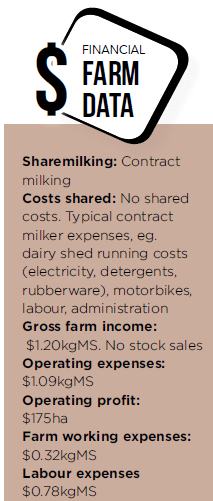
Rachel and Brian always do a pros and cons list when considering their next onfarm position to see if the farm matches their goals. Next for the couple is a progression to 50/50 sharemilking in Roto-o-Rangi, also operating a system 4 on 74ha but with an increased herd size of 285 crossbreds, so they will be managing more stock, but with lighter cows.
“We are really excited to be sharemilking next season, particularly owning and breeding our own cows,” Rachel says. One of their biggest challenges is controlling farm working expenses while running a system 4 with rising costs, especially the supplementary feed costs.
They believe having the most efficient animals on our land in New Zealand, the easier it will be to meet climate and environmental regulations. Brian and Rachel try to operate in a straightforward and simple manner, and check in frequently to see if they are doing things in the most efficient way, which has resulted in them creating monthly and weekly plans and standardising procedures for milking routines and pasture management. The couple say their communication is really good and their strengths and weaknesses complement each other, leading to a highly productive workplace, “we make a great team and strive for excellence”.
Being in the competition enabled them to use more of the tools available through industry bodies such as DairyNZ. They look forward to being on the DIA committee in the future and participating in the industry. This reflects their attitude of wanting to improve the public perception of the dairy industry in the media however they can. Brian and Rachel think that there is no better job than farming – there is such a variety of work and the journey never ends.


